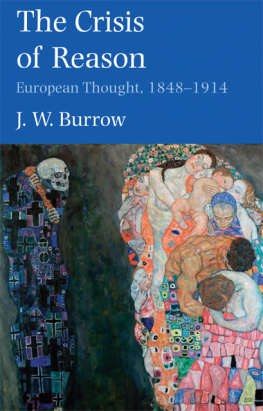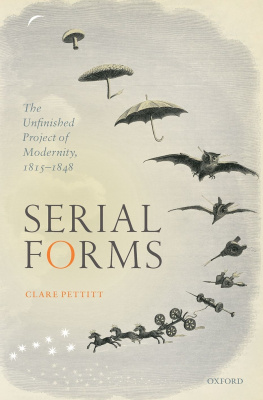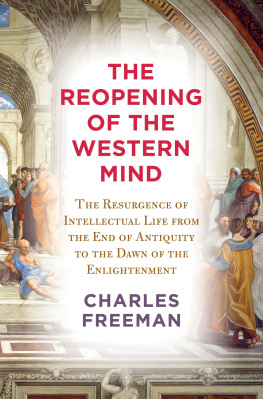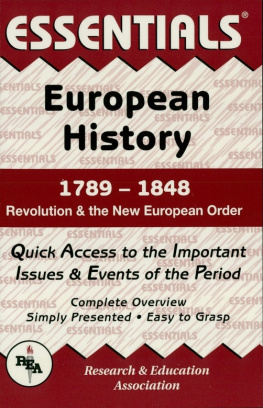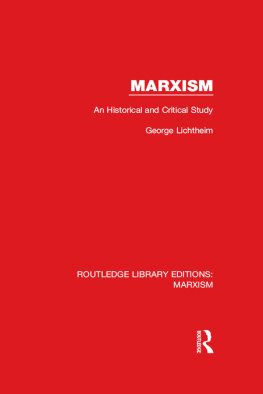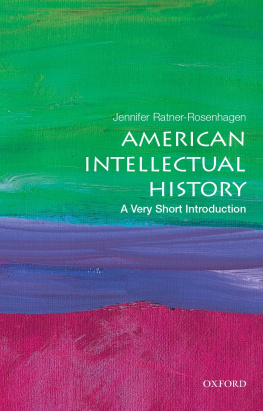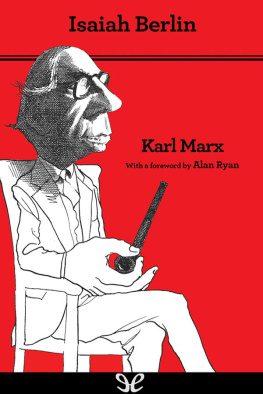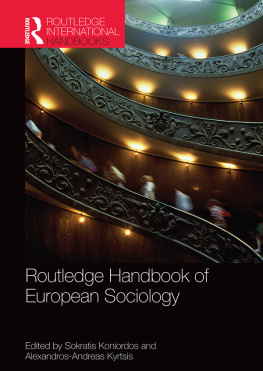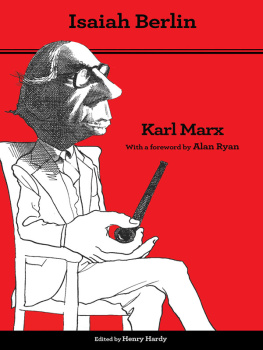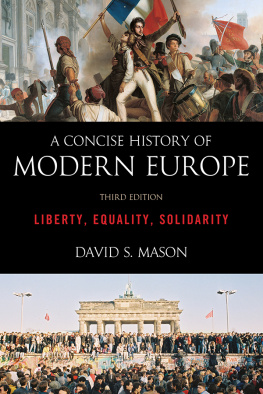
The Yale Intellectual History of the West
General Editors:
J. W. Burrow (University of Oxford)
William J. Bouwsma (University of California, Berkeley)
Frank M. Turner (Yale University)
Executive Editor:
Robert Baldock
This series seeks to provide a chronological account of the intellectual life and the development of ideas in Western Europe from the early medieval period to the present day.
Now available:
Medieval Foundations of the Western Intellectual Tradition, 4001400
by Marcia L. Colish
Forthcoming:
The Intellectual Renaissance, 14001550 by Ronald Witt
The Waning of the Renaissance, 15501640
by William J. Bouwsma
The World of Knowledge, 16401720 by Peter N. Miller
Reasons Empire: The European Enlightenment, 17101790
by Anthony Pagden
Intellectuals in a Revolutionary Age, 17501860
by Frank M. Turner

Copyright 2000 by J. W. Burrow
All rights reserved. This book may not be reproduced in whole or in part, in any form (beyond that copying permitted by Sections 107 and 108 of the U.S. Copyright Law and except by reviewers for the public press) without written permission from the publishers.
Set in Ehrhardt by Printline, New Delhi
Printed in Great Britain by St Edmundsbury Press
Library of Congress Cataloging-in-Publication Data
Burrow, J. W. (John Wyon), 1935
The crisis of reason : European thought, 18481914/J.W. Burrow.
p. cm.(Yale intellectual history of the West)
Includes bibliographical references and index.
ISBN 0-300-08390-4 (cloth : alk. paper)
1. EuropeIntellectual life19th century 2. EuropeIntellectual life20th century. 3. Philosophy, Modern19th century. 4. Philosophy, Modern20th century I. Title. II. Series.
CB204 B87 2000
940.8DC21
99-059165
A catalogue record for this book is available from the British Library.
10 9 8 7 6 5 4 3 2 1
For Bob Johnson in gratitude
Contents
1.1 The New Generation
1.2 The Conservation of Matter and Energy; Materialist Reductionism
1.3 The Enigma of Consciousness and the Impact of Evolution
1.4 The Claims of Science: Science as Vocation
1.5 The Reaction against Materialism: Phenomenalism, Pragmatism and Pan-psychism
2.1 A Classified World
2.2 Social Evolution as the Division of Labour
2.3 Sciences of Religion and Culture: France, Britain, Germany
2.4 Social Darwinism, Eugenics and Race
3.1 The Market and Modernity
3.2 Community: The Mark, the Mir and the Guild
3.3 The Ethical State
3.4 Nation and State in Germany
3.5 Nationalism and the Critique of Modernity: Myth and Charisma
4.1 The Burden of Freedom
4.2 Character
4.3 The Flux of Experience
4.4 The Unconscious
5.1 Work of Art and Microcosm
5.2 Decadence and Life
5.3 The Calling and the Deed
6.1 Incarnation
6.2 Myth and Revelation
6.3 The Occult
Preface
This book is concerned with the history of ideas in Europe in a particular period. Obviously this formula can do with some expansion. What it is meant to indicate is that the intention throughout has been an historical one: to place the reader in the position of an informed eavesdropper on the intellectual conversations of the past. The books obligation, that is, is not so much to what we now think important in the period as to what was then found important, among educated but not narrowly specialized readerships with a taste or even craving for ideas. I have not paid statistical attention to questions of sales, numbers of editions and so on, though I have tried to alert the reader to cases of extreme popularity and influence or temporary neglect. But intellectual dead-ends which made a stir in the world have counted for more with me than portentous moments which were then not recognized as such. The former are part cynics might wish to say the major part of the texture of the intellectual life of the past.
By speaking initially of conversations, however, I mean to issue a caveat against too ready an assumption of an overall coherence, perhaps fostered by the word period. The latter, it seems to me, is best thought of as thematically overlapping circles in which are generated and invested contemporary intellectual excitement, aspirations, hopes, bitterness and dread. It must be a rare autodidact who seeks to inhabit all of them, though many inhabit more than one, while ideas, suitably transmuted, and the concerns they express, are able as it were to bounce from one circle to another. That is why a purely disciplinary approach to the intellectual life of the past is too limiting. Conversations, even arguments, flowed beyond the boundaries we, up to a point arbitrarily, set for them. So, while not presupposing coherence, as we do when we speak Zeitgeist. world-view, ideology, hegemony and other terms from the same self-confident semantic family, I have tried to be alert to the occurrence of transfers and analogues.
These analogues and recurrences derived partly from a complex intellectual heritage and partly from an understandable desire to test the limits of powerful and fashionable concepts developed in particular fields: scientific law, evolution, the division of labour, competition, the work of art, myth and the unconscious mind are obvious examples. The correspondences derive also, however, from the perceived importance of three associated contexts, political, social and cultural, on which contemporary awareness was concentrated. The political was the advent of democracy, in the sense of representative institutions based on a wide though not necessarily universal adult male suffrage. This became a common phenomenon in all the weightier European states except Russia, from the 1870s onwards, after the unification of Italy and Germany, the establishment of the Third Republic in France, and the adoption of an urban working-class franchise in Britain after 1867. To speak of the achievement of popular sovereignty would be an oversimplification, but the perception that this was now the reality, or at least the destiny, of the modern state, with the associated rise of socialist political parties, was a powerful conditioner of middle-class anxiety, pessimism and fastidiousness.
The anxiety was enhanced by the other two contexts. The first was the growth of great cities with mass populations, of which London was the precursor, Paris in many ways the archetype, and Berlin the prodigy of the age. The great city and its teeming population was the dominant social image of the period: its excitement, its horrors, its threat to social order and decency, its physical and moral squalor and unhealthiness, its dwarfing impersonality. It was in the great city that the new democracy lurked, perhaps beyond the reach of civilizing influence.
This kind of concern was linked also to the third condition, the moral and cultural vacuum of an age which was now beginning to be thought of as post-Christian, among the masses as well as among the educated. This development had, of course, a long history, stretching back to the eighteenth-century Enlightenment, though after the French Revolution there was something of a religious revival and it was not until the 1840s and 1850s that alternatives to Christianity began to be widely and confidently entertained. Initially these tended towards a social humanitarianism (considered below in the Prologue) and pious contemplation of nature as conceived by the natural sciences (less the remedy for a spiritual void than its leading symptom. Confronted, too, by the possible consequences of mass irreligion, even some atheists came to see the problem less as the persisting grip of a decaying Christianity than as the need to replace it and, for the individual, the need to fashion out of spare and questionable post-Christian materials a self that would not be overwhelmed by the freedom secured to it by a fulfilled liberal agenda, by the social coerciveness of democratic society and by the pressures and solicitations of modern urban life.
Next page
